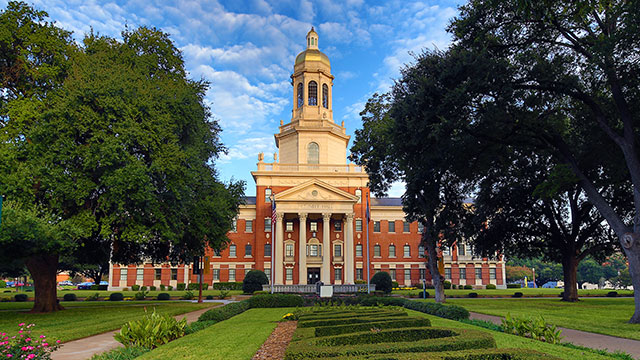Spring 2017
Twenty-five years ago, around twenty classical Christian schools joined together to form the Association of Classical and Christian Schools (publisher of this magazine).
To reinvent K–12 in a classical model, new ACCS schools were built largely from the ground up.

But college is a different story. Colleges in the U.S. are much more diverse—and nearly all of them have access to public student financial aid. Research universities, private liberal arts colleges, technical schools, Christian colleges, and state colleges all compete for students. In this more competitive market, collegiate education has thrived for many decades. But recently, cracks have been showing. Tuition has grown rapidly, but the mission of “college” has also been under scrutiny. Three additional forces have also changed college.
THE FIRST IS VOCATIONAL.
College is widely viewed as a path to a specific vocation. “What do you want to be when you grow up?” has turned to “What will you major in at college?” One parent joked, “What’s the difference between a liberal arts education and a Domino’s pizza?” Answer: “One of them can feed a family of four.” And, we’re all interested in our children earning a living. But the myth is that your career will be necessarily tied to your college major.
THE SECOND IS IDEOLOGICAL.
We have moved to a post-Christian world, with colleges (many Christian colleges included) leading the way. The decline in the relevance of liberal arts college programs at nearly all colleges follows the pursuit of left-leaning ideologies. Christian liberal arts colleges are often inadvertently impacted by the secular orthodoxies of materialism, deconstructionism, pragmatism, and higher criticism.
THE THIRD IS SHORT-SIGHTEDNESS.
College does more than train for a job. College is a time when students orient themselves toward the future and all areas of life. In past times, college cultivated virtues that were to be both useful in life and important for the greater culture. Today, the very idea that college “cultivates virtue” would bring a chuckle to most Americans.
A Note to Grammar School Parents
If you want college in your child’s future, what can you do to get young children on the right track? We looked around at the prevailing views of our day, and opinions are varied. Lengthy books have been written expounding upon activities and educational practices to make this happen. The arguments are often profound. But there are two simple ideas everyone seems to agree on.
1) Provide your child with a great education.
2) Get your kids used to the idea of college.
A GREAT EDUCATION
If your child is already at a classical Christian school, this is probably covered. Logic, writing, public speaking, analysis, discipline, focus—all are invaluable at college, and we are hearing over and over again from alumni that their classical Christian education provided these skills.
THE COLLEGE IDEA
How do you get kids used to the idea of college? It’s simple. Talk about it. Look at college information together. It’s only a click away. Discuss with your kids the opportunities they have, and how they can take advantage of them.
◆ “I know you were frustrated with the rules you had to follow in your report, but you seemed to enjoy the subject. Maybe you could be a history teacher, then you could call the shots! Did you know [a college] has a great history program, and a classical teaching program …”
◆ “You had fun helping dad fix the radio. Do you think you’d like to design things for a living? Did you know that’s what an engineering degree will do? Actually, there are all kinds of engineering, and you can pick …”
◆ “Look! There’s where I went [or wanted to go] to college.”
Making college a simple, obvious, and familiar step will go further than you think to get your kids on the collegiate road.
TIPS ON CHOOSING A COLLEGE
The ACCS amassed a list of over 1700 academic, 4-year colleges in the U.S. Finding the right choice means knowing a few little-known secrets.
“Major in the Classics” does not mean classical Christian
Most colleges have a classics department that studies the history, language, and literature of Greece and Rome. These programs often do not integrate Christian theology, worldview, medieval, or later Great Books studies. While the terms are similar, the approach and classics major is quite different from classical Christian. It’s fine to study the classics, but the confusing terms may lead students to misunderstand their options.
“Liberal Arts” does not mean classical Christian
True, the nineteenth-century term for “classical Christian” was a study in the “liberal arts.” But, in the past 150 years, the liberal arts school has generally been remade in a variety of forms. Today’s liberal arts college, even with Christian roots, may not hold to Christian theology as the source of truth, or to Christian worldview cultivation. Often, they are not Great Books oriented. Often, they do little logic or rhetoric. Parents and students must evaluate these colleges individually.
It’s not all about the major
Colleges market majors like products on a store shelf. Does a college have a highly rated theater program? An excel- lent horticultural department? Look first at the professors Luke 6 tells us that the student shall become like the teacher. Most students and parents, it would follow, should be very concerned about the teachings and character of the professors at the college. After all, the student will likely absorb the paideia of the teacher. At large colleges, it can be impossible to research or be influenced by all of the professors. But, before choosing a small college or program, students should find the likely professors they will have and research them on the internet and through the books they have written.
Clarify the College Choice
As with any competitive business, a sophisticated marketing industry has grown up around “college.” With parents paying the bill, financial aid in the mix, countless choices and “majors,” and the prospect of a 4-year experience not unlike a cruise ship or a summer camp, colleges market themselves in a variety of enticing ways. Often, these mask the real reason for college— to grow intellectually and spiritually.
WHY DO YOU PLAN GO TO COLLEGE?
Answering this question can help narrow your choices.
◆ TO BE TRAINED IN A VOCATION OR DISCIPLINE: For example, If your purpose is be trained in professional disciplines like an engineer, nurse, physical therapist, chemist, computer scientist, or accountant, you are choosing a training program. If this is your primary purpose, choose a college based on how its program rates for job placement or graduate acceptance.
◆ TO BE TRAINED IN A PRACTICED ART: Many programs are intended to train students for semi-artistic disciplines like writing, journalism, theater, clergy, counseling, or in some cases, business. Classical Christian colleges are an excellent choice for these areas of study. Some, like business or journalism, may have specific undergraduate courses offered as an extension of a Great Books core. Students may want to consider schools like Kings College, Biola, or Houston Baptist for a mix of skills and classical options that train students in universal abilities to think, speak, and write well.
◆ TO FURTHER YOUR EDUCATION: If a student wants to pursue an education that will give a significant advantage in almost any future pursuit, teach in a classical Christian environment, pursue scholarship, or isn’t sure of their vocational direction, a classical Christian college may be an excellent choice. Far from “impractical,” classical colleges offer unparalleled training to write well, speak well, and make wise decisions, and they train in the art of learning. These are skills pursued by businesses and professions across the spectrum. Since many professional areas require a master’s-level or higher degree, these types of colleges—like NSA or Patrick Henry College—prepare students well for areas like law, journalism, or other “practiced arts.”
HONORED TO RECEIVE AN INVITATION TO APPLY BY A TOP 25 COLLEGE?
The college marketplace has created some strange behavior. For example, U.S. News and World Report ranks colleges annually. One factor they use: acceptance rates. So, for a college to increase their ranking, they can simply get more students to apply, reject them, and their ratio of number of accepted applicants over their total number of applicants goes down. Voilà, they appear more selective. ![]()










